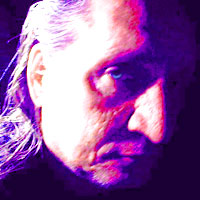|
John Tuschen |
 photo by A. Muzi |
John Tuschen was the first Poet Laureate of Madison, Wisconsin from 1977 until 2000. His impact on Madison and the arts has been tremendous.
He was born in Chicago in 1949 and grew up elsewhere. He obtained a B.S. in Rehabilitation Psychology in 1992 from the UW and an M.S. in Rehabilitative Psychology in 1996. Tuschen worked as a Chemical Abuse Specialist/Psychotherapist. He was also co-director and publicist for "Fat Rap & Jazz", was assistant manager for Gallery 853, copywriter for Education Presse, and Music and Art Critic for The Daily Cardinal.
He was named Poet Laureate for the city by Mayor Paul R. Soglin in 1977. The City of Madison Cultural Affairs Commission and the Dane County Cultural Affairs Commission awarded Tuschen many grants for his work. He also received a John A Johnson Scholarship in 1989.
Fat Rap 'N Jazz was a series of poetry and jazz evenings at the Madison Arts Center, with local and out-of-state talent. Tuschen invited Gregory Corso to kick off the series. He brought Corso back with Allen Ginsberg and William Burroughs in 1982. They called the follow- up event, "An Old Beat, A New Tune—The Reunion." The series continued for a year and a half.
As assistant gallery manager at Gallery 853, Tuschen organized poetry readings, hung paintings and did public relations. As music and art critic for The Daily Cardinal, he covered riots going on against the war in Vietnam under different names and would also publish people's poems and review art galleries. Tuschen also worked in the schools with children, in the Poets-in-the Schools program. He was involved in poetry readings on the radio through grants and put together a series of shows on WORT called "Neal Bohemian Poetry with New Music and Jazz" with great titles like 'Genital Democracy' and 'Soft Beads on a Cushy Mic.' and a lot of improv. He did readings with bands and at rallies. He brought beat era performance poetry to Madison in unfamiliar venues. In 1981, Tuschen was responsible for putting together a program called "The Reunion" at the Nitty Gritty in Madison.
Another venue of poetry Tuschen was involved with was the Broom Street Theater, one of the most respected theaters in the country. He founded their poetry magazine The Camel, The Lion, and The Child [CLC], which he edited in the late '60s and then it became The Broom Street Magazine. At that time there was a movement called the Commission of Small Press Editors and Publishers dedicated to small presses, to get poetry out there. The Broom Street Bacchanals were another project of Tuschen's, including plays, poetry readings, music and dance. (Bacchanal is Greek for 'big party'). He started 'The Free State Street Poetry Sheet.' Local poets would write something, mimeograph, and bring them out to the street and hand them out.
Tuschen went to Paris for a year on a private grant to write a novel. Following his return he threw a party and burned it. "It was the worst thing I had ever read in my life!" While in Paris, he worked as a copywriter for Education Presse translating encyclopedias from English to American, and also read at the American College in Paris.
In 1970 he left the Madison poetry scene to travel to "Vermont, Canada, California, and parts unknown" following involvement in riots and radical activism. The Bugle-American called him "a secret revolutionary society of one, and with any luck he will stay that way."
Tuschen wrote all of his life. His adopted parents still have a small sheet of paper that he wrote lines resembling poetry on when he was four. He was the editor of his High School paper and was Senior class president. Tuschen felt that his main influences were Whitman and Ruth Stone, who lives in Vermont and was his mentor for many years since he met her as a visiting poet at the University. He also had a relationship with her daughter Phoebe in the late '60s. He said"Ruth Stone has taught me that poetry is a way of life, a way of seeing things, of getting through or to things, capitalizing things, and making things beautiful. Taking the mundane and making it magic."
Tuschen lived in Madison off and on since 1967. He also lived in Montreal, Boston, Toronto, and New York. He wrote four books of poetry; Junk Mail (Broom Street Press), Thighs, Sighs, and Other Things (Quest Publishing), The Percodan Papers (Quest Publishing), and Tuschenetrics (Quest Publishing). He also had over 600 live readings across the United States and in Europe. His last collection of poetry, called Clinical Echoes and Other Poems, is still waiting for someone to publish it. He had completed a novel on inverse dream states and autism.
This bio is condensed from an web article in Poetic Voices by R. C. Travis in July 1999; read it at: http://lf.org/milosz/tuschen/Tuschen_files/9907Tuschen.htm.
John Tuschen died of an esophageal hemorrhage on August 12, 2005. He was 56 years old.
Streams of two radio programs that John and Bill Miosz did at lf.org/milosz/web/audio/tuschen1.m3u and http://lf.org/milosz/web/audio/tuschen2.m3u.